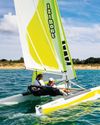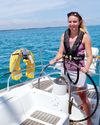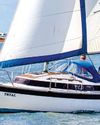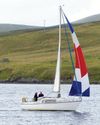
It fits! Time to make myself a celebratory cuppa
Some years ago I was working on my boat, ashore in the yard. I felt, rather than heard, the explosion and by the time I'd scrambled the few yards to the mooring pontoon I was confronted with what was left of a Westerly Centaur. The whole deck assembly, including the mast and spars, had been blown the height of a three-story building before landing back on top of the remains of the hull.
There had been one person on board and of course he was rushed to hospital, fortunately with relatively minor injuries. It seems that having been at the centre of the explosion the shock wave rushed away from him.
The experience left me with a permanent concern about explosives in boats. As most skippers are aware, gas and petrol fumes are heavier than air and will sink into the bilge from where there is nowhere to go. The resulting mixture of gas and air is of course highly explosive and can only be cleared by pumping, and then only if you are lucky.
When we bought Freda one of the first jobs was to have the gas installation checked. The engineer made a few changes before signing it off, and of course we had it checked every couple of years after that. Nonetheless we were increasingly uncomfortable with having gas on board, to say nothing of the cost of the stuff.
Just for fun compare the cost of a cylinder of Calor gas with a tank of petrol, bearing in mind that petrol is taxed.
A litre of meths lasts 41/2 hours non-stop use
As with most boats, on Freda gas was used solely for cooking. The only alternative fuels were paraffin or meths, and in the distant past have come close to setting a boat on fire trying to light a paraffin cooker.
We took a closer look at meths (denatured spirit if you want to be pedantic). The people we met who used it were perfectly happy with meths so we did more research.
This story is from the June 2022 edition of Practical Boat Owner.
Start your 7-day Magzter GOLD free trial to access thousands of curated premium stories, and 9,000+ magazines and newspapers.
Already a subscriber ? Sign In
This story is from the June 2022 edition of Practical Boat Owner.
Start your 7-day Magzter GOLD free trial to access thousands of curated premium stories, and 9,000+ magazines and newspapers.
Already a subscriber? Sign In

Orca sink yacht in Strait of Gibraltar
Spain's maritime rescue service, Salvamento Maritimo, has reported that a 15m (49ft) yacht sank in Moroccan waters in the Strait of Gibraltar following interaction with a pod of orca.

No kill cord or lifejackets were worn during fatal powerboat crash
A kill cord and lifejacket are useless unless worn-that's the warning from the Marine Accident Investigation Branch (MAIB), following its investigation into a powerboat crash that killed a 32-year-old woman and five-year-old girl on 2 October 2022.

Multihull sail work
Brush up on multihull sailing skills before heading off on charter with Gavin Le Sueur's guide to spinnaker handling, tacking and gybing

Five top causes of engine failure and how to prevent them
Jake Kavanagh talks to Sea Start marine engineer Nick Eales about how to avoid the five major causes of an engine breakdown at sea

Sail the Atlantic with strangers
Would you sail across the Atlantic with someone you've just met? Ali Wood meets the cruising crews who've done just that

IZIBoat: simple sailing
Rupert Holmes sails an innovative catamaran design intended to widen participation in sailing among those with little time to get on the water in more conventional craft

30 WAYS TO GET AFLOAT
From tall ships to small dinghies, you needn't own a boat to sail. Ali Wood looks at the options, and how skippers can also find crew

Boats for restoring under £20,000
Duncan Kent picks the best sub-35ft sail and power boats to look for when aiming to undertake a restoration on a budget

Seaworthy dinghies for less than £500
For low cost traditionally-styled GRP trailer-sailers, consider the Foreland and the Otter available at bargain basement prices

Playing with coloured sails
Maintaining an hourglass-shaped balloon and ratcheting up the log numbers